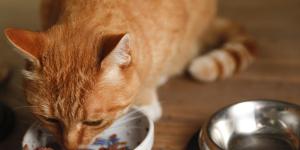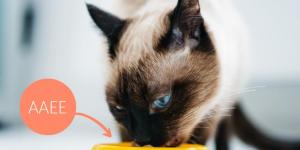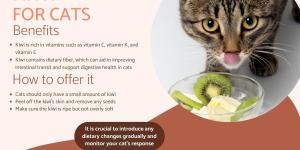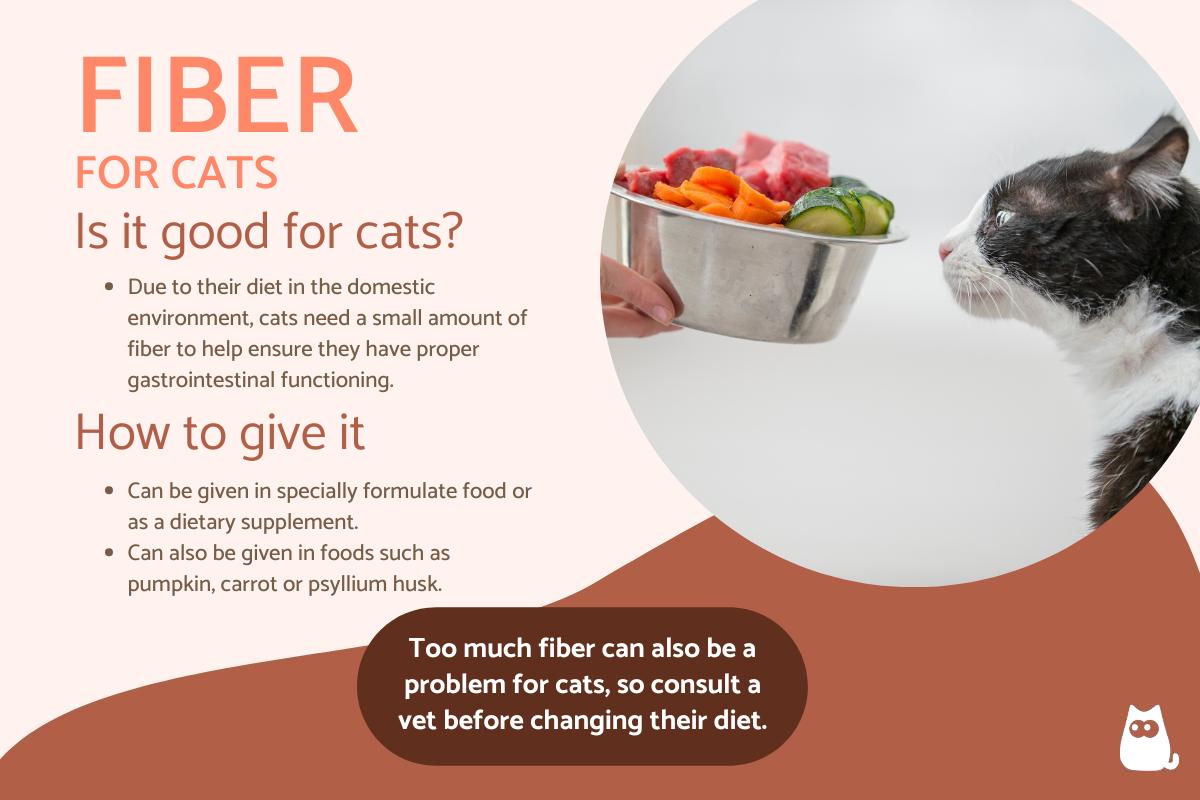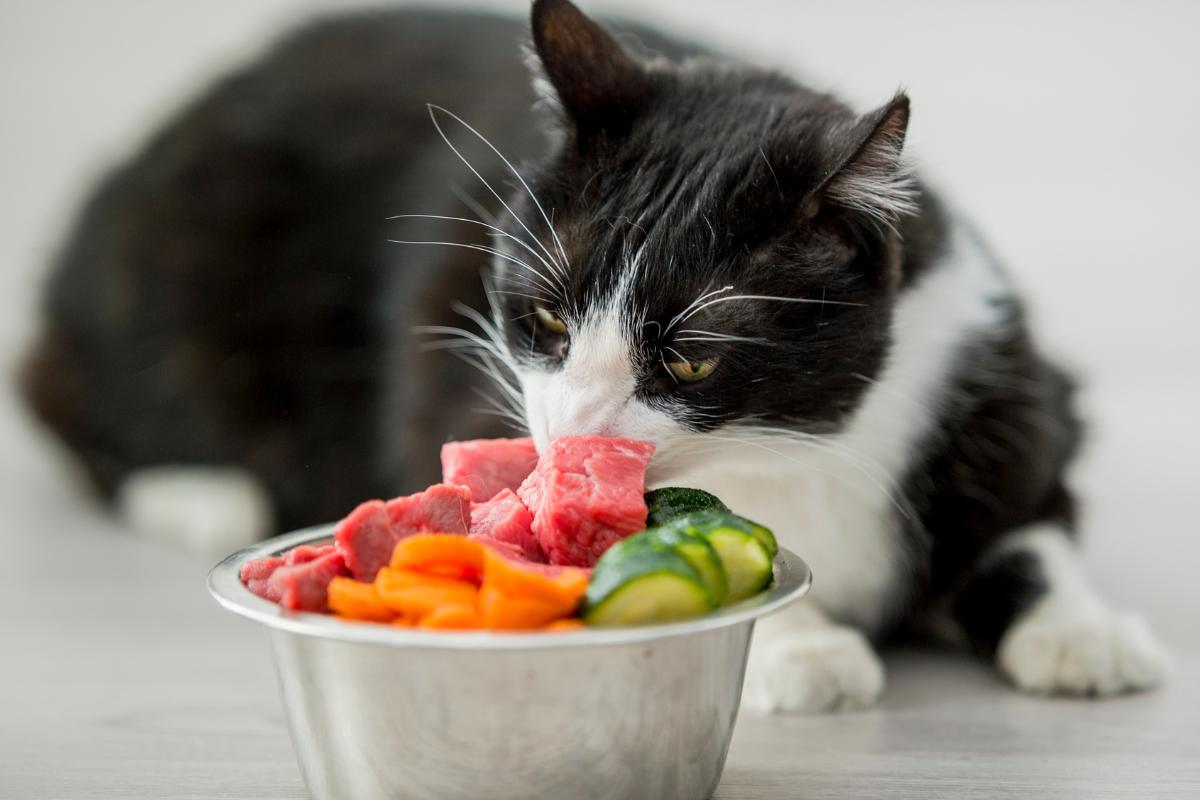Fiber for Cats - Sources, Supplements and Importance

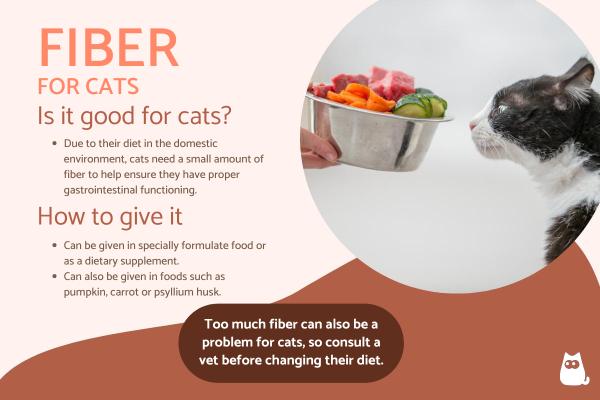

See files for Cats
Cats are obligate carnivores and need a high amount of protein in their diet to meet their nutritional needs. This does not mean it is the only important nutrient for cats. While fiber is most associated with vegetables and grains, it is necessary in the diet of a domestic cat. This might seem contradictory, but the reason is related to the differences between the diets of domestic cats and their wild cousins. Fiber is important for digestive health, but also influences other factors such as weight control, the prevention of blockages and management of blood sugar. Not all cats will have the same dietary needs, with some felines potentially requiring more fiber in their diet than others.
Since knowing how much fiber a cat needs is difficult, AnimalWised shares more information about the food sources, supplements and importance of fiber for cats. This includes how you need to incorporate fiber into your cat's diet, especially if you are feeding them homemade food.
Why is fiber for cats important?
Fiber is a type of carbohydrate that is not digested by the digestive system of felines, unlike other nutrients such as proteins or fats. Fiber can be soluble or insoluble:
- Soluble fiber: fiber that dissolves in water, allowing it to absorb moisture and soften stool, making it easier to pass.
- Insoluble fiber: does not dissolve in water, adding bulk to stool and helping move waste through the intestine. This improves bowel movement and prevents constipation.
Cats need fiber to help ensure the proper functioning of their gastrointestinal system. As we stated in the introduction, cats are obligate carnivores. In the wild they almost exclusively obtain the nutrients they need to survive from animal prey. Since animal meat does not contain protein, this can seem contradictory.
The difference between the diet of wild cats and domestic cats is that the cat doesn't only eat the meat from animal prey. They also eat other parts, such as fragmented bone, feathers, fur, ligaments and other tissues. These tissues act as roughage for the cat and help ensure healthy digestion. The food we provide domestic cats does not usually contain these elements, so we need to provide roughage in the form of dietary fiber.
Unlike herbivores or omnivores, felines do not require large amounts of fiber to be healthy. A relatively small amount will be enough to ensure proper digestion and proper intestinal transit. It will also be sufficient for preventing issues such as constipation or hairballs. In fact, too much fiber in a cat's diet can have negative consequences. These include an upset stomach, flatulence or diarrhea.
Discover more about the importance of fiber for cats with our article asking how can I help my constipated cat?
What is fiber for cats used for?
We have explained why fiber needs to be included in the diet of cats. It is for this reason we will see cat food which contains dietary fiber, both dry kibble and wet food. The following are some of the specific reasons why cats need some fiber:
- Improves bowel movement and digestion: in addition to protein, animal prey contains other elements which act as roughage for the cat. Dietary fiber provides the roughage necessary to ensure proper intestinal transit, allowing for digestion to carried out and preventing constipation.
- Weight control: especially if they are restricted to living indoors, many domestic cats struggle with obesity. Dietary fiber helps the cat to feel satisfied for longer. This helps to prevent overeating, while still giving them enough energy to be active.
- Hairball reduction: hairballs occur due to the accumulation of hair in the digestive tract. Their location affects their symptoms and effect on the cat's well-being. Since fiber improves gastrointestinal transit, it helps prevent hair accumulating and the subsequent formation of hairballs.
- Improved gut health: in addition to its functionality, fiber can help maintain balance of the cat's gut biome. It does so by taking on the role of a prebiotic, indirectly helping the animal to improve nutrient absorption.
- Regulating blood glucose levels: by regulating digestion and improving nutrient absorption, dietary fiber can slow the absorption of glucose and prevent high glucose levels in the blood. This can benefit cats with diabetes or insulin resistance.
What food for cats is high in fiber?
While cats need animal protein to survive, this doesn't mean they can't eat other foods. There is a wide variety of fiber-rich foods which can be beneficial for cats, especially if they have a digestive issue such as constipation. There should be fiber in their food already, but some food with fiber for cats can be used as a supplement:
- Pumpkin: contains both soluble and insoluble fiber, helping to improve digestion and regulate intestinal transit.
- Carrots: rich in insoluble fiber, which helps add bulk to stool and facilitate its passage through the intestine.
- Psyllium husks: an excellent source of soluble fiber that improves intestinal motility and promotes healthy digestion.
These foods can be mixed with your cat's wet food to provide extra fiber. However, it is very important you do not give too much fiber to your cat. Fiber needs to be provided in moderation to avoid digestive problems related to excess fiber.
High-fiber cat food
Cat food is sold in different formulations to cater to the needs of different cats. While there is a general guide for cat nutrition, each feline is an individual. Different factors affect their dietary needs, such as age and the presence of underlying health conditions. Some cat foods are formulated for cats which are fiber deficient.
Before you decide to give your cat high-fiber food, you need to ensure they need it. For this reason, you should speak to your veterinarian. They will be able to determine if they have a health reason why more dietary fiber should be included in their diet, as well as to avoid giving them too much.
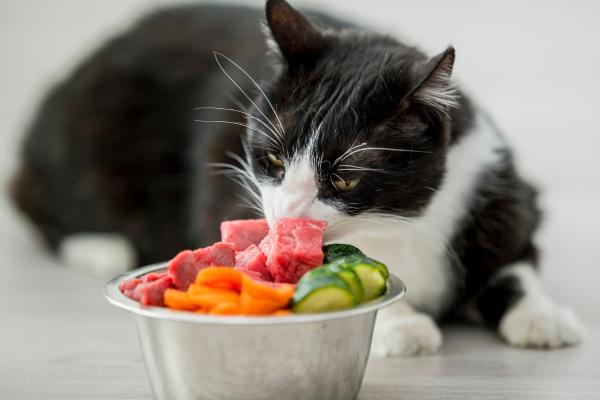
When are fiber supplements for cats necessary?
You can include high-fiber foods in a cat's diet or change to a cat food brand which is especially formulated for cats with fiber deficiency. There are also fiber supplements which are sold to help ensure proper digestion in the cat or aid with the various health issues we have shared above. These fiber supplements for cats include the following:
- Powder: easy to mix with food, such as psyllium for cats, pumpkin fiber or beet fiber.
- Gel or paste: useful for preventing hairballs, they usually combine soluble fiber and certain oils. These includes malt paste for cats which is formulate to contain extra fiber.
- Snacks or treats: a practical way to add fiber to your diet.
- Probiotic blends: there are probiotic mixes for cats which contain fiber and help to improve overall gut health. Learn more with our article asking are probiotics safe for cats?
If you are concerned about whether your cat is eating enough fiber, you will need to speak to a trusted veterinarian. They will assess the cat's specific needs and may recommend fiber supplements in the following cases:
- Cats with constipation, constipation or slow intestinal transit: they help improve intestinal motility and soften stools.
- Long-haired cats: this cats are prone to hairballs or trichobezoars, so additional fiber facilitates the passage of ingested hair through the intestine, preventing it from accumulating.
- Overweight or obese cats: as fiber increases the feeling of satiety, supplements may help to control appetite. Learn how to tell if a cat is overweight with our related guide.
- Cats with mild colitis or intestinal sensitivity: supplements that also contain probiotics are often recommended to improve the balance of intestinal flora.
You can learn more about the importance of fiber in cats as part of a balanced diet with our article sharing the recommended fruits and vegetables for cats.

If you want to read similar articles to Fiber for Cats - Sources, Supplements and Importance, we recommend you visit our Healthy diets category.

